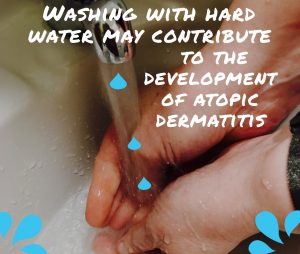Washing With Hard Water May Contribute to the Development of Atopic Dermatitis
* The association between exposure to hard water and skin barrier impairment was evaluated in this study of individuals with and without atopic dermatitis. Skin washed with hard water displayed increased transepidermal water loss (skin’s ability to retain moisture) and increased irritation. Patients with atopic dermatitis who had filaggrin (is a protein that is vital for skin cells to mature properly and form the outermost protective layer of skin) mutations had greater skin barrier impairment compared with individuals with atopic dermatitis without filaggrin mutations and individuals with healthy skin. An ion-exchange water softener reduced the effects of hard water on skin barrier impairment.
* Washing skin with hard water increases irritation and impairs the skin barrier, particularly in patients with atopic dermatitis and filaggrin mutations, and may contribute to the early development of atopic dermatitis.
Living in a hard water area is associated with an increased risk of atopic dermatitis. Greater skin barrier impairment following exposure to surfactants in wash products combined with high calcium, and/or chlorine, levels in hard water is a compelling mechanism for this increase. The purpose of this study was to investigate this mechanism in individuals with and without a predisposition to skin barrier impairment. We recruited 80 subjects; healthy controls and atopic dermatitis patients with and without FLG mutations. The skin of each participant was washed with sodium lauryl sulfate (SLS) in water of varying hardness and chlorine concentration, rinsed and covered with chambers to determine the effects of surfactant residues. Sites washed with hard water exhibited significantly increased sodium lauryl sulfate deposits. These deposits increased transepidermal water loss and caused irritation, particularly in atopic dermatitis patients carrying FLG mutations. A clear effect of chlorine was not observed. Water softening by ion-exchange mitigated the negative effects of hard water. Barrier impairment resulting from the interaction between hard water and surfactants is a contributory factor to the development of atopic dermatitis. Installation of a water softener in early life may be able to prevent atopic dermatitis development. An intervention study is required to test this hypothesis.
At Botanica Medica our Naturopaths come across lots of interesting studies and are always updating their knowledge. If you or a loved one suffer from atopic dermatitis, eczema or any other skin condition that you would like help in clearing up, then make an appointment with one of our Naturopaths call Botanica Medica on 8271-1827 today. They are only to happy to share the knowledge they have gained through their studies and patient outcomes, and get you feeling better. Botanica Medica is located at 97 Glen Osmond Road, Eastwood and appointments are available Monday to Saturday including some after hours.
Published in Dermatology
Journal Scan / Research · October 04, 2017
Journal of Investigative Dermatology
Jeffrey Scott, MD


Recent Comments